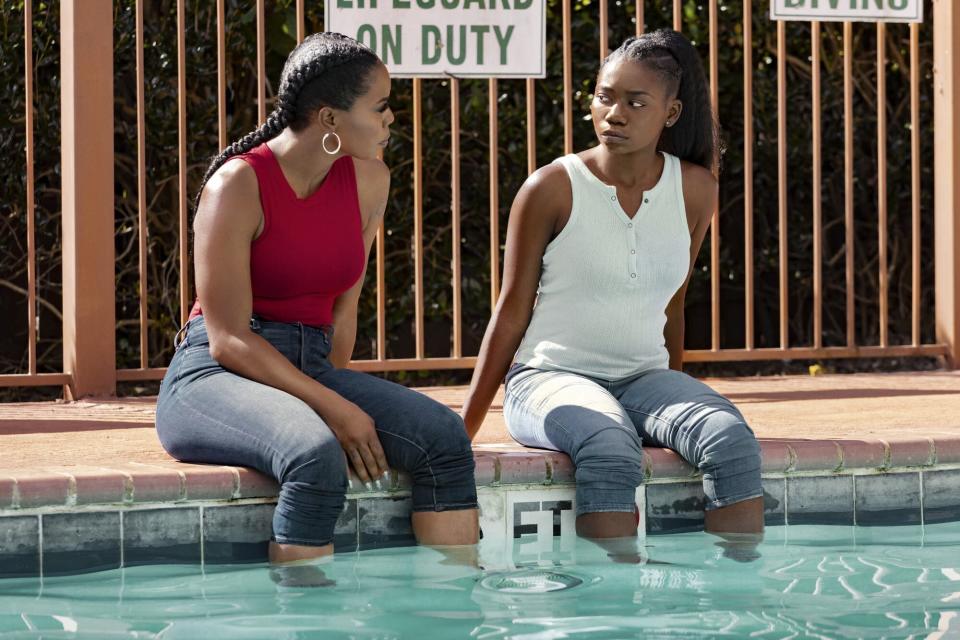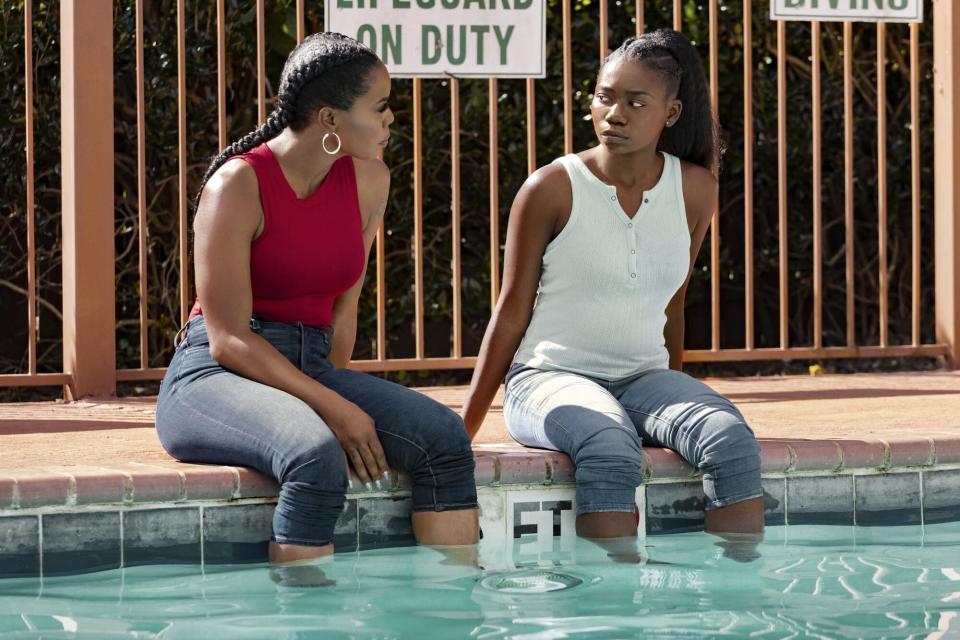P-Valley creator Katori Hall could not have known how timely season 2 episode “Jackson” would be when it was planned.
The episode follows Mercedes (Brandee Evans) and her daughter Terricka (A’zaria Carter) as the teen struggles to decide what to do about an unplanned pregnancy. While the teen tries to navigate all her feelings about having a body, P-Valley explores the harsh reality of what Black women experience and the complicated feelings about abortion.
“Reproductive rights of women in Mississippi is something we wanted to cover from season one because [Mississippi] has one of the most restrictive laws in regard to abortion,” Hall says, “We felt it was imperative for us to find a storyline that could deal with this issue because we use fiction in order to tell the truth.” The result is a powerful hour about what Black teen girls face airing at a time when someone like Terricka would have even fewer options.
“We had no idea obviously that the today of Mississippi we were writing would become the yesterday because you can no longer get an abortion in the state,” Hall shares, noting the exceptions are when a pregnancy is caused by rape or to save the mother’s life.


Kimberly Simms/Starz
During “Jackson,” Mercedes says, “pregnancy is life and death for us,” which speaks to the initial intent of the episode. “It’s a sad reality that we as Black women face daily going to our OBGYN or our [primary care physician],” Evans says. It’s what she faced when dealing with the preventable stillbirth of her daughter and as a caregiver for her mother, which required her to fight for fair treatment and care. “No one goes the extra step to make sure that we are really okay,” she adds.
In addition to Mercedes’ line, there’s an exchange in the episode where Terricka says she believes abortions cause cancer, which incorporates another part of the problem: misinformation. “[It] is rampant in our society, communities, and in our families,” according to Hall. Concerning Terricka’s words, the show creator says you can learn how the state mandates for providers have played a part in the misinformation regarding abortion in the documentary Jackson. “The South being a socially and religiously conservative part of America is part of why there is so much looking away from these issues, particularly in young women,” Hall explains. That results in young people having to make decisions without all the information and children not having difficult yet necessary conversations at home.
One of the heaviest scenes features Mercedes and Terricka walking into the clinic in Jackson for an appointment. At that point, Terricka had not decided what she wanted to do, yet there were protestors ready to shame the young teen for simply walking inside. “They told us we would have people outside the clinic, and my face was real when Mercedes got out of the car. I remember thinking about what it must be like trying to make a life choice for yourself, and having people scream at you is just terrible,” Evans recalls.
With a mix of judgment, misinformation, implicit basis, lack of sex education, and other factors, Terricka’s decision about her own body is much more complicated than it should be. Making matters more heartbreaking to Evans is how the present makes what is already a grueling episode for Terricka impossible. “This clinic has been closed in Jackson, so this would not have even been a choice for her to make about her own body,” she explains.


Kimberly Simms/Starz
Housed in this timely story is the result of Mercedes’ hard work to build a life for her and Terricka. Evans didn’t know her character would be a mother when she landed the role, but it’s been her primary motivation. We see it in her attempts to leave the strip club and the room she always kept for Terricka in her home. “It has been a beautiful relationship with us. I’m very close with her and her parents,” Evans says of her bond with Carter, “I’m very honored to have that relationship with her, so even when it came to this storyline we talked very candidly about things that have happened in both of our lives.”
Mercedes loves Terricka, but her mother Patrice Woodbine (Harriett D. Foy), forced Mercedes to have Terricka. Throughout the hour Mercedes fights her instincts to give her daughter the autonomy she was never given. “For Mercedes, this journey down to Jackson is an opportunity to hold space for this young woman to find her own decision, and that is what the universal fight is about. How can we have a constitutional right for women — no matter how old — to make decisions for [themselves],” Hall explains.
With the overturning of Roe V. Wade, this episode puts what is currently happening in the context of how quickly things change. “It’s important for people to see how today can become yesterday really fast,” Hall shares. Her hope is folks are vigilant about what else may be at risk on the back of this life-changing decision by the Supreme Court. After watching, she also hopes people have compassion for women and understand that abortion isn’t about right and wrong but gives people the dignity of choosing what happens to their bodies. “It doesn’t feel real to know that our rights were completely stripped from us. It’s very clear that this country does not care about what women feel about their bodies, and we don’t have a choice about our bodies,” Evans shares.
“Mercedes gave [Terricka] the choice to have an abortion, and she chooses that, but now it’s going to be a different conversation because at this point in Mississippi, if this happens to a 14-year-old, what are you going to do?” Evans explains.
P-Valley airs Sundays on Starz.
Sign up for Entertainment Weekly‘s free daily newsletter to get breaking TV news, exclusive first looks, recaps, reviews, interviews with your favorite stars, and more.
Related content:




